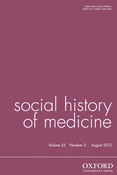-
Views
-
Cite
Cite
Markus Oppenauer, Annette Hilt, Isabella Jordan and Andreas Frewer (eds), Endlichkeit, Medizin und Unsterblichkeit. Geschichte—Theorie—Ethik, Social History of Medicine, Volume 25, Issue 3, August 2012, Pages 737–738, https://doi.org/10.1093/shm/hks032
Close - Share Icon Share
Extract
This volume discusses the results of a research project on the history, theory and ethics of medicine conducted by scholars from the Universities of Erlangen-Nürnberg, Köln, Bonn, Mainz and the Hannover Medical School. The opening chapter is about the vision of Athanasia (immortality) and its role within contemporary medical culture, and the closing chapter relates to the natural boundaries of human life and how strategies applied to deal with them (re)shape the modern health care system and other aspects of society. The content between these two chapters includes research especially on perceptions of a ‘good death’ in Western countries, the ars moriendi tradition in Medieval and Early Modern Europe, apparent death discourses in the Enlightenment, trans- and post-humanism, cryonics, palliative care and hospice movements in the late twentieth century. Here, psychologists and theologians, biologists and historians, philosophers and political scientists investigate various (historical) concepts of death and dying and strategies to deal with the limitedness of human life. They also allude to aspects of the broader (social, economic, political, cultural) environments of these phenomena.




